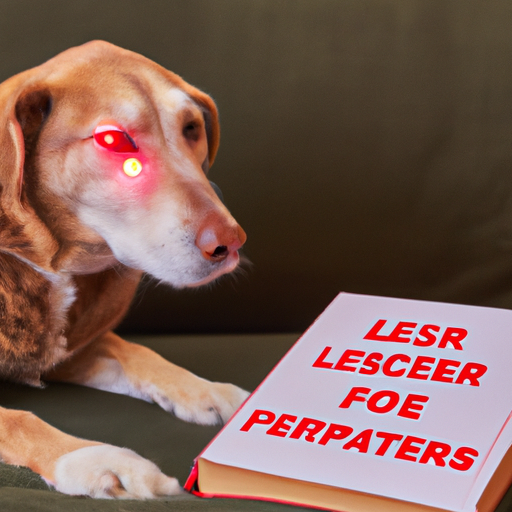Understanding Your Dog’s Predatory Instinct
You might think that a laser pointer is a fun toy, an easy way to get your dog up and running around. And indeed, dogs do love to chase after that little dot of light that darts across the floor. However, what you may not realize is that the chase is more than just a game for your four-legged friend. It’s a call to their innate predatory instincts.
For dogs, the act of chasing is a form of hunting. They’re programmed by nature to detect and pursue movement, whether it’s a squirrel scampering up a tree or a red dot dancing on the carpet. When they finally catch up to their quarry, it provides a sense of satisfaction and fulfillment. But with a laser pointer, there’s nothing to catch, and this can lead to frustration and confusion.
The Psychological Impact
You’re a caregiver, so you understand that mental health is just as important as physical health. This is true for your dog as well. Constantly chasing after a laser pointer can lead to obsessive behaviors and chronic stress.
Imagine if you were given a task that you could never complete, no matter how hard you tried. How would you feel? Frustrated? Anxious? Your dog feels the same way. They might start to show signs of anxiety, like pacing, excessive barking, or destructive behaviors. They might also become fixated on the laser pointer, constantly watching and waiting for it, even when it’s not in use.
Potential Physical Dangers
In addition to the psychological issues, there are potential physical dangers associated with laser pointers. The most obvious is the risk of eye damage.
| Potential Dangers | Description |
|---|---|
| Eye Damage | If the laser beam is shone directly into your dog’s eyes, it can cause temporary or even permanent damage. |
| Physical Injuries | In their excitement and determination to catch the elusive red dot, dogs may run into furniture, crash into walls, or take a tumble down the stairs. |
| Overexertion | Dogs, especially those who are overweight or have health issues, can overexert themselves during these intense play sessions, leading to exhaustion or even more serious health problems. |
Better Alternatives for Playtime
- Fetch: This classic game still provides the thrill of the chase, but with the added satisfaction of catching and retrieving the object.
- Tug-of-war: A game of tug-of-war can be a great way to engage your dog’s predatory instincts in a safe and controlled manner.
- Puzzle toys: These toys require your dog to solve a puzzle in order to get a treat, providing both mental and physical stimulation.
Remember, you’re not just your dog’s owner; you’re their caregiver. It’s your responsibility to ensure that their needs are met, both physically and psychologically.
FAQ
Q: Can I use a laser pointer if my dog seems to enjoy it?
A: While your dog may seem to enjoy the chase, the potential physical and psychological harm outweighs the momentary fun.
Q: My dog has been playing with a laser pointer for years. Should I be worried?
A: If your dog shows signs of anxiety or obsession, it would be best to replace the laser pointer with safer alternatives.
Q: What if I use the laser pointer sparingly?
A: Even occasional use can lead to frustration and obsession. It’s best to avoid using laser pointers altogether.
Q: Are there any safe ways to use a laser pointer with my dog?
A: No. The risks associated with laser pointers make them an unsuitable toy for dogs.



